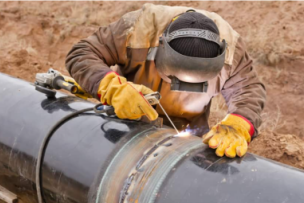As a brand of Saint-Gobain, a world leader in sustainable habitat, Norton offers the widest portfolio of grinding, cutting, blending, finishing and polishing solutions for all markets, materials and applications with the most advanced and affordable technology. So, as your needs evolve, our access to the global expertise of Saint-Gobain becomes even more valuable to making a difference in your day-to-day needs. And, we don’t have to look far for more localized expertise with our largest research center located right nearby in Northboro, MA.
Have you ever noticed when reviewing details about coated abrasive products, they include a description of the backing material used to construct the product? Coated abrasives have different backings because they are used in many different types of applications. Coated abrasives come in a variety of backing types, such as cloth, paper, mylar, screen, combination, and fiber. These backings can also have sub-categories for thickness, flexibility, material, and strength. The more flexible backings will provide a better finish, but the stronger the backing, the better the grain retention on the backing, which can help it last longer under demanding loads. Below is a closer assessment of the types of cloth backings used for coated abrasives.
Norton products are available in several different types of cloth for all types of applications. Alphabetical letters are used to differentiate the different types of cloth backing. There are four main types of backing classifications from the most flexible to the least flexible. The most flexible is classified with a J, and the least flexible, but strongest, with an H.
J-Weight
This cloth backing is lightweight and extremely flexible. It can be made out of cotton, rayon, or polyester depending on the application. Cotton will finish uniformly and conform to the workpiece better than rayon or polyester. J-weight backings are strong enough for many applications; however, they will not work for high pressure or heavy stock removal situations. This backing should be used for a detailed workpiece, blending, and finishing. J-weight backing products are not normally available in coarser grits; therefore, the main grits are 60 through 600.
X-Weight
This backing is also available in cotton or polyester and is stronger than J-weight. The added strength makes the material less flexible than the J-weight backing. Still, there are ways to flex this material to make it conformable to the workpiece for applications too demanding for J-weight. This backing can be used for medium-pressure applications that require stock removal and applications that need a final finish. X-weight has the largest grit range from 24 through 400.
Y-Weight
Stronger and more resistant than J or X-weight, Y-weight is used more than any other backing. Most Y-weight backings are made of polyester, but some designs may have a combination of nylon or cotton. This backing is used for demanding applications where the end-user is going to be removing a high rate of stock or is required to run the machine at higher pressures. All types and sizes of abrasive grains can be used on any backing; however, more advanced grains like ceramic will be used on Y-weight backings. The most popular grit ranges are 24 through 120.
H/HH-Weight
H/HH-weight is the strongest cloth backing used for extreme-pressure, heavy stock removal operations. This polyester material is very strong and durable and will conform to the workpiece. This backing's main goal is to remove as much stock as possible regardless of the finish. This type of backing is used mainly in wood applications such as rough sanding and metal forging. Because of the limited applications, the main grits available are 24 through 50 grit.
There are standard rules about which backing should be used for different types of applications, but it ultimately depends on the end-users’ methods and final finish requirements. For rough sanding wood, 24 grit can achieve the required finish, but in the food industry, their requirement for finishing is more detailed. Also, there are manufacturing conversion methods offered by Norton to make any backing more flexible so stronger, less flexible backings can be used for different types of applications. The ideal backing to use is one that can last the longest, fit the desired application, and provide that final finish.
Previously Featured on Norton's Resources page.
Browse abrasive solutions from Norton on MSCDirect.com.







Talk to Us!
Leave a reply
Your email address will not be published. Required fields are marked *